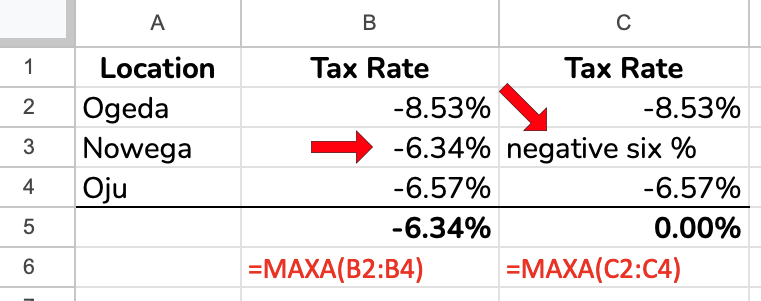MAXA evaluates all arguments and returns the highest numeric value.
While the MAX function is a go-to for finding the highest numerical value, MAXA in Google Sheets offers more versatility. It can handle a broader range of data types, making it a valuable tool for various tasks. Here’s a quick guide, along with some examples:

Contents
Syntax
=MAXA(value1, [value2, ...])
- Arguments:
value1: The first value or cell reference (required).[value2, ...]: Optional arguments for additional values or cell references.
Similar Functions
MAX – Finds the largest value in a dataset. Ignores text and boolean values.
MAXA – Finds the largest value in a dataset of numbers, text, and boolean values.
MIN – Finds the smallest value in a dataset. Ignores text and boolean values.
MINA – Finds the smallest value in a dataset of numbers, text, and boolean values.
Examples of the MAXA Function
You can get these examples in this Google Sheet to follow along.
Example 1 – Finding the Highest Sales Figure
Imagine you have sales data in cells B2:B4 and want to find the highest sales figure.
Enter this formula in any empty cell: =MAXA(B2:B4)

This formula evaluates all values in B2 through B4 and returns the cell containing the highest sales number – $26.96.
Example 2 – Including Text Values (as 0)
Your data (B2:B4) might have text entries like “out of stock” alongside other numbers. MAXA will consider these text values as 0.

If “out of stock” is in B3 along with numerical values, the formula =MAXA(B2:B4) will still identify the highest actual sales number as $15.55, identifying “out of stock” as 0.
Example 3 – Negative Numbers and Text
One of the few ways MAXA can produce a different result from MAX is with negative numbers. Let’s take a look at a list of tax rates. The rates in columns B and C are all negative numbers, but a text string represents one of the numbers in column C.

Because the function recognizes the text in C3 as 0, it returns 0 as the maximum value. After all, 0 is larger than any negative number.
Example 4 – Dates
Dates may seem like their own data type, but they are just numbers. Each date is one whole number more than the last. Because of this, we can use a function to find the latest date.

Since dates are numbers, let’s look at the numbers these dates represent.


After changing the formatting to a number with no decimal places, it is easy to see why the later date is also the largest. MAXA evaluates the dates in B2 through B5 in this list of season start dates. December 21, 2024 equals 45,647, the largest number on the list.
Video Tutorial
Notes
- This function considers both numbers and text values. However, text values are treated as
0. - This function also considers logical values with
TRUEbeing1andFALSEbeing0. - Unlike MAX, which ignores non-numerical values, MAXA considers them in the calculation (as
0).
Related Articles
MAX vs MAXA – Finding the largest value in Google Sheets
